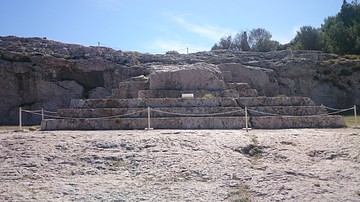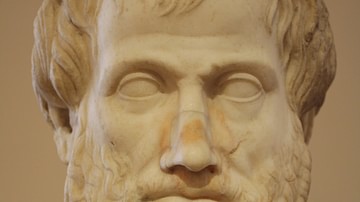Search
Remove Ads
Advertisement
Summary 
Loading AI-generated summary based on World History Encyclopedia articles ...
Search Results

Definition
Protagoras
Protagoras of Abdera (l. c. 485-415 BCE) is considered the greatest of the Sophists of ancient Greece and the first philosopher in the West to promote Subjectivism, arguing that interpretation of any given experience, or anything whatsoever...

Article
Protagoras of Abdera: Of All Things Man Is The Measure
Protagoras of Abdera (l.c. 485-415 BCE) is most famous for his claim that "Of all things the measure is Man, of the things that are, that they are, and of the things that are not, that they are not" (DK 80B1) usually rendered simply as "Man...

Article
Protagoras's Paradox
The sophists in ancient Greece were a class of teachers who, for a fairly high fee, would instruct the affluent youth in politics, history, science, law, mathematics and rhetoric as well as the finer points of grammar and history. They professed...

Definition
Pre-Socratic Philosophers
The Pre-Socratic Philosophers are defined as the Greek thinkers who developed independent and original schools of thought from the time of Thales of Miletus (l. c. 585 BCE) to that of Socrates of Athens (470/469-399 BCE). They are known as...

Image
Democritus & Protagoras
A painting by Salvator Rosa (c. 1663 CE) depicting the two Greek philosophers Protagoras (right) and Democritus (centre). (Hermitage Museum, St. Petersburg)

Article
Plato's Lie In The Soul
Plato's Lie in the Soul (or the True Lie) is a concept appearing in Republic, Book II, 382a-382d, defined as "being deceived in that which is the truest and highest part of or about the truest and highest matters" or, in other words, being...

Definition
Greek Philosophy
Ancient Greek philosophy is a system of thought, first developed in the 6th century BCE, which was informed by a focus on the First Cause of observable phenomena. Prior to the development of this system by Thales of Miletus (l. c. 585 BCE...

Definition
Wonhyo
Wonhyo (l. 617-686 CE) was a Korean Buddhist philosopher whose works impacted a wide array of later philosophers and writers through his teaching that one’s interpretation of the world created one’s reality. He is highly regarded as the greatest...

Definition
Critias
Critias (l. c. 460-403 BCE) was an Athenian politician, poet, and playwright, one of Socrates' followers, Plato's second cousin, a leading member of the Thirty Tyrants of Athens, and leader of the oligarchy they established. He is referenced...

Definition
Aristotle
Aristotle of Stagira (l. 384-322 BCE) was a Greek philosopher who pioneered systematic, scientific examination in literally every area of human knowledge and was known, in his time, as "the man who knew everything" and later simply as "The...